Real Estate
Rent, Buy or Build in Mexico?

Advantages of Renting
1. Try first and then decide
There are many unique areas in which to live along the lakeside. Some folks choose to live within the traditional Mexican villages, more isolated from the foreign community. Others choose high-security gated communities. Some prefer the energy and hubbub of the downtown areas; others want a more quiet, secluded location. Some rely on local transportation and others bring their cars with them, allowing more options in choice of location. Some prefer to be down by the lake and others prefer a hillside view. Some even prefer to live in Guadalajara -- a city of six million people.
Many people who rent, have moved at least once if not twice before settling in to their ideal place. Others come down here for a few months and decide they don't like it and move back to the States or Canada. Different strokes for different folks!
Renting keeps your options open.
2. Flexibility
You can get weekly and monthly rentals or a longer term (up to five years) lease. If you decide Mexico living is not for you, there's no need to sell your property back home. If you decide you want to travel for an extended period of time, you can often sublet your home or apartment.
3. Minimum Initial Investement
This is obvious. Generally, the first month's rent is required along with a deposit. If there is a telephone in the rental, then a telephone deposit will also be required. Many rentals include the gardener. The renter is typically responsible for the maid and utilities.
Rental prices typically vary from $350 to $1200 per month depending on what you want and where you want to live. Rentals are at a premium during the two high seasons (November to April and July to August).
Disadvatages of Renting
1. Compromises
Almost all rentals come furnished. The furniture and decor may not be to your liking. If you rent during the high seasons, choice is limited and you'll probably have to settle for less than you want.
2. Rental Management / Landlords
Some rental management companies are difficult to work with -- even difficult to find. Others do a fine job. See if you can talk to previous tenants or neighbors to check before you sign on the dotted line. Older houses often have maintenance needs which a new renter may have difficulty managing. It may be advisable to hire a third party to check out the plumbing, electricity, appliances and water.

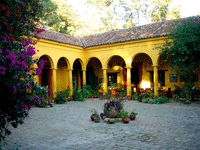
Advantages of Buying
1. Getting what you want
There are more homes available for purchase than for rental. And, if you find a home you like in an area you love, it is very inexpensive to have improvements made to your home. You can furnish the home and landscape the gardens to your taste. Often, existing homes are sold furnished, so you can move right in and take your time refurbishing and redecorating. Other homes can be "bare bones" and will require some investment before you move in.
2. Ease of Purchase
You need to be careful purchasing property in Mexico. Work with a reputable notary and a reputable real estate firm. (In Mexico a Notario is much like a senior lawyer in the States or Canada. They are lawyers especially appointed by the government to handle property transactions, after additional training and examination.) Do your homework. Get recommendations. Locals typically know who is honest and who is not. You can buy property either through a bank trust or directly with a Deed of Trust. I signed only two papers -- an offer and a limited Power of Attorney. I gave power of attorney to my realtor to sign the final papers and simply had to wire in my funds. My deed was mailed to me about two months later.
3. An Investment?
The economy is reasonably stable and both home and land prices have steadily increased over the past few years. Even with the drastic devaluation of the peso, homes purchased in American dollars lost only about 10% of their value. Since then, owners have more than made up that loss. Property taxes are almost non-existent and you can sell without paying Mexican capital gains if you own the home for 24 months while having an FM3 or FM2 Visa.
Disadvantages of Buying
1. Large Investment
Homes here are usually purchased with cash. Until recently, financing a home was not an option because of the high interest rates. Some owners (Americans or Canadians) will offer terms; but this is uncommon. Homes range from $30,000 to over $1 million. Most foreigners purchase homes in the $60,000 to $250,000 range. Like anywhere else, the higher the price, the better the view, amenities and quality of construction. These prices may seem very cheap to Californians, but not necessarily to Mid Westerners.
2. Lack of flexibility
Homes tie you down. Depending on the market and time of year, it may be difficult to sell your home and recoup your investment. If you buy a house and then discover you don't like the location or your neighbors, your options are limited. If you travel frequently, you'll need to find either renters or someone to look after your property. I don't think it's a good idea to leave a nice, furnished home empty. As in any country, a vacant house is an invitation to robbery.
3. Buyer beware!
There are very few consumer protection laws here. You buy a house "as is". There are no disclosure requirements. There are no mandatory inspections. Get the picture? You are responsible to become an informed buyer. Don't count on your realtor to point out any of the negatives. We all learn painful lessons through this process. Do your homework! And, be ready to accept the fact that you'll learn as you go. Don't let a few surprises sour your attitude. It's a beautiful country with kind people. Just be careful and get good help.

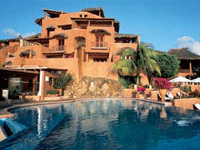
Advantages of Building
1. A Good Investment
Like anything else, if you buy low and sell high, it's a good investment. Land values have been skyrocketing, but with diligence it's still possible to find fairly priced lots and build your own dream house. You'll go through the agonies of the building process, but you'll likely have a home which will be worth much more than you paid. The construction process is very different in Mexico; but there are good contractors and good architects to help you.
2. You get exactly what you want
This is a no-brainer. Go on tours of homes and understand what you want. Depending on your skill and background in building homes, you can do-it-yourself or hire competent people to assist you. Make sure you are here while the work is being done. It is absolutely necessary to supervise the work on a daily basis. There are no short cuts here.
Disadvantages of Building
1. Mañana
Because Mexico is a different culture, things just don't get done when we believe they're supposed to. It always takes longer. Be prepared for delays in getting materials and labor. Slow down, relax. Go with the flow.
2. You don't always get what you paid for.
At the risk of being repetitious, do your homework. Most important, talk to several references and look at the quality of work.
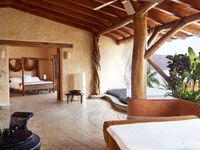
Mexican Trusts: Fideicomisos

Enjoying the Mexican beachfront or colonial hillside town, you've decided to put down roots in Mexico and "save money" by buying in.Think twice: you may make the deal of a lifetime, or you wish you'd never become involved. Invest a significant amount of time before investing in Mexico real estate. Get to know the terrain, its problems and advantages. Work hard to understand the area, the people and the real estate values. Get the assistance of someone who speaks and reads Spanish fluently so that you don't miss legal nuances and idioms. Even though you may have bought and sold real estate in the United States, the Mexico experience is a totally new experience. You're not in Kansas anymore, Toto.
Under the Mexican Constitution, only Mexicans have the right to own land or receive mineral or water rights. Foreigners have the right to own real property, provided they do not invoke the protection of their government. That sounds reasonable enough, doesn't it? All this means is that any dispute concerning land ownership will be decided by Mexican courts, treating foreign landowners the same as Mexican nationals. Foreigners have no legal recourse in the legal system of their homelands. This is done to prevent the historic recurrence, prevalent in Latin America in the past 200 years, of a capital-exporting country meddling in the sovereign affairs of another nation to protect a private party's economic interests.
Foreigners are prohibited from directly owning real estate within the "Forbidden Zones" of 100 kilometers of the Mexican border and 50 kilometers of its coasts. Within these restricted areas, foreign ownership is possible under a d or bank trust.
Under the fideicomiso (pronounced Fee-deh-com-EE-soh), a Mexican bank trust is created for a period of 50 years, and the trust may be extended for another like period. Legal title to the property is held by the bank, as trustee, and beneficial use is held by the property buyer. Even in non-restricted areas, the fideicomiso may be used by foreigner landowners and Mexicans alike for the same reasons that trusts are created in this country. Under the fideicomiso, multiple or successor owners can be named. The costs of establishing the fideicomiso are not great: an initial set-up cost is based upon a percentage of the property value, and annual trustee fee is charged.
While zoning restrictions may not be apparent in commercial and residential neighborhoods, certain areas may have building codes to preserve colonial flavor. For instance, downtown Morelia has enforced a historical building preservation code for the past hundred years. Private land ownership may be barred in forested areas, natural protected areas, reserves, biospheres and other environmentally protected areas. That beautiful isolated mountaintop or bucolic site may be out of reach for the same reasons that it's just real difficult to buy a chunk of the Grand Canyon or Central Park.
Historical antecedents have limited large land-holdings in agricultural areas. Size, irrigation, and productivity limit the amount of farm land which can be owned by a single entity. Presumably, you're not planning to farm in Mexico, anyway. If you're really determined to do so, there are ways to accomplish this goal, but you'll need more legal advice than we can give you here.
In Mexico, anyone can offer real estate for sale. There are no license laws regulating real estate brokerage and sales... all the more reason to exercise caution to search out a reputable and established real estate company. Commissions are usually about 7 percent of the actual sales price, although they may be higher in resort areas.
Now that you've found your dream property, how are you going to pay for it? Forget about financing... unless you plan to finance a stateside property to pay for your Mexican dream. Lack of capital markets and high interest rates force most foreign-purchased real estate purchase to be made in that quaint tender, cash. As the Mexican economy opens, new sources of financing may become available, but high mortgage interest rates will make the worst of American interest rates pale in comparison and will not create the traditional 20- or 30-year mortgages Americans have considered the norm.
Unlike stateside real estate transactions, closing costs borne by the buyer are considerably greater in Mexico. Customarily, the buyer pays 1) the transfer tax, which is 2-6% of the appraised value of the land, 2) notario's fees, usually 2-3% of the appraised value. The appraised value used for deed (escritura) purposes is often much lower than the actual sales price. The notario, a special breed of lawyer who has been delegated quasi-judicial functions and acts much like public recorder, performs what amounts to a title search, obtains "no lien" certificates, secures an official appraisal, verifies that there are no unpaid taxes or water bills which could cloud title, drafts the deed. All real estate transactions must involve a notario, who has virtually no relation to the American notary public.
The seller pays any capital gains tax and the agent's commission.
Real estate prices may be established in dollars. Don't feel that you're being gouged as an unsuspecting American; it's common practice in devalutionary times. Payment made by made by wiring funds from a U.S. bank to a Mexican correspondent bank in the U.S. or to a casa de cambio.
Because telephone lines are purchased by each customer, the buyer will need to determine whether phone service is included in the real estate purchase. Light fixtures and garden statuary which generally stay with the property in the U.S. are often not part of the real estate purchase in Mexico. Find out what's included and what's not to avoid surprises when you take possession.
Because Mexican landlord-tenant laws, which vary from state to state, are tenant-oriented, making eviction extremely difficult and costly, most leases tend to be written to protect the landlord. In some areas, Mexican landlords prefer to rent to foreigners --- not so much for higher rental income as for the foreigner's ignorance of landlord-tenant laws.
While locales can differ significantly, normal rental values are 1% per month of the property value. A $200,000 property would likely rent for $2,000 per month. One-year contracts are common, with one- and three-year renewal options with predetermined rate increase formulas. Normally, a cosigner is required, and a one or two month rental deposit can be applied to the last month's rent. The tenant usually pays for utilities, water, gas, telephone, cable TV, and condominium maintenance fees.
In resort areas, time share hawkers are rampant. Beware of the high risks involved, because Mexican law provides very little legal protection to the time-share owner. If you absolutely must invest in a time-share, do so with full warning and preferably with a stateside company. And be warned that the resale market is extremely poor.
Competent legal counsel (your own, not the seller's or the real estate broker's) is mandatory. Just as you'd carefully watch your backside making your first real estate deal at home, don't let your guard down in Mexico. Fully warned, go ahead and reap the pleasure of Mexican property ownership. While your upfront costs may be higher than you contemplated, you'll benefit from significantly lower property taxes and utility bills. And you'll feel like a real part of Mexico as a property owner.
Real Estate in Mexico & The Notario Publico

Even as a tourist you may buy real estate in Mexico. This may be owned through a Mexican bank trust or in your own name. With a bank trust, or (fideicomiso) it is simple to transfer title upon sale through a Mexican notary public. Beneficiaries may be named in case of death. A Mexican will is not required.
Should you decide to own property in you own name, a deed called an escritura must be prepared by a Mexican notary public. In some states in Mexico it is now possible to name beneficiaries in the deed but, if this is not the case, it is well to have a Mexican will prepared to avoid expensive legal fees and probate at the time of death.
There are great differences between the United States notary public and Mexican notary public. In the United States the notary public may be the local butcher, the new accounts clerk at the bank, the secretary at the office, or practice any other occupation.
In Mexico, the notary public (notario público) is a public official appointed by the State Governor. He has the capacity to attest and certify documents and business and legal transactions that require authenticity. He also provides for strict security of original records and documents.
Some of the requirements for becoming a Mexican notary public are as follows:
There is supposed to be one notary for each 30,000 people.
In Mexico, every legal document, such as deeds, wills, powers of attorney, constitution of corporations, establishment of trusts and other legal transactions must be made before a notary public in order to be valid. If the document is not notarized by a Mexican notary public it is not legal!
When buying real estate and you reach an agreement, go to the notary public first. The buyer chooses the notary public. For real estate transactions you do not need an attorney. The notary public is completely capable and legally authorized to carry out the transaction.
In many cases an attorney will delay the transaction, charge you unnecessary high fees, and have absolutely no bearing on the situation, as it is not of his competence. Before giving any type of down payment or committing yourself to a deal, take a copy of the actual escritura (which should be given to you by the seller with no argument if everything is in order) to the notary public to check the deed's validity.
If buying property from a developer, have the notary public check to see that he has his permits for the development and for construction. A beautifully engraved certificate or formal letter promising a deed at some future time is not a deed, but merely a sales contract.
Have the notary public determine that the land is not ejido land (communal agricultural land). The right to use this type of land can be purchased, but always a risky deal, as it is not your property, you are only allowed to use it.
Insist on making all real estate transfer agreements before a notary public. Do not be pressured by someone who says that you need to put money down right away.
The notary public will need from both parties to the transaction: proof of full names, marriage certificates, proof of dates and place of birth, official identification with a photograph, such as passport or driver's license, and your visa to prove that you are in Mexico legally.
The notary public will need from the seller:
The process is not over yet -- the notary public must register the escritura in the Registro Público de la Propiedad (Public Registry of Properties). This should be done promptly, as the transaction is not valid until registered. A normal time frame for this is around two weeks.
Property within sixty-two miles (100 kilometers) of the border and thirty-one miles (fifty kilometers) of the coast must be held in a bank trust. You will need a permit from the Secretary of Foreign Affairs.
The buyer may choose the bank that will handle his trust, and may want to shop around to determine where he can get the lowest fees.
Most real estate transactions in Mexico are not fraudulent. The fraudulent deals are fairly rare and definitely not the norm. Any transaction done with a notary public should not have any problems, as he or she is legally responsible that everything is in order. People who buy real estate in Mexico often invest their life savings in their "dream" retirement home, and everyone should be aware of Mexican laws and be cautious.
Sometimes people are so impressed with the natural beauty and climate of Mexico that they "throw caution to the wind" or "leave their brains at the border." This has been referred to as "margarita fever."
Another consideration: Is the property you are thinking of buying, readily marketable should you decide to return to the United States or your native country?
We have found that most real estate brokers and developers are honest and above board. Should their sales techniques be like those of a "time share" salesman pressing for "an impending happening close" for the transaction, be careful.
Basic safeguards on real estate purchase do not yet exist in Mexico as in the United States or Canada. There is no credit bureau to check on the developer's financial condition. It may be difficult to locate liens, and there is no title insurance.
For the typical person off the street, you need a notary public to hold your hand right from the first steps of the transaction--a title search takes him at the most a few days. If there is any potential problem, the notary public will not foul his good name and will let you know immediately.
Chances are that you will never have a problem when buying real estate in Mexico. Just be diligent in doing your "homework" and be a little more cautious!
Mexico Real Estate & Taxes
Everyone involved in real estate has heard the adage "Location, Location, Location." While undoubtedly this saying has a lot of truth to it, no less true is the following: "Taxes, Taxes, Taxes." Consider as well that when two countries can claim tax jurisdiction over you or your property, things become quite complicated. Real estate is a good example of this. Various taxes related to real estate transactions are calculated differently in Mexico and the U.S. The key is to know when one can be claimed as a tax resident, know when property is subject to taxation and to know what taxes one can be subject to. This guide will briefly analyze these issues from the Mexican perspective.

Tax Residence
As far as the governments of Mexico and the U.S. are concerned, you are a tax resident of the country in which you keep your principal residence. Your legal residence is of little consequence. For example, you may have been living in Mexico on a tourist visa the last five years, but for tax purposes you would more than likely be considered a tax resident of Mexico.
Unfortunately for U.S. citizens and residents, you are required to report and possibly pay taxes on your worldwide income, regardless of residence. The consequence is that most Americans who reside in Mexico are subject to at least two very different tax jurisdictions: Mexican and U.S.
Furthermore, the location of the property, one could say the residence of your property, is important as well. Each country reserves the right to tax property within its boundaries. Not surprisingly, both Mexico and the U.S exercise this right.
Property Taxes
In Mexico, property taxes are known as the predial. Compared to property taxes in the U.S., the cost of the predial is quite reasonable. It is a local tax and, in most areas, it is payable quarterly. This tax bill is usually received in the mail, and can be paid at the local bank. Another option is to request that the bank deduct the tax bill from your account when the bill becomes due and payable.
It is important to remember to keep close track of the paid tax bills. You will need to show the paid receipts when the property in question is sold, or otherwise changes hands.
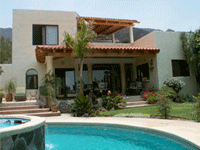
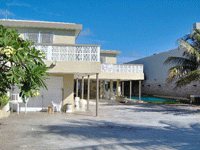
Income Taxes
According to the Mexico-U.S. Income Tax Treaty, and the Mexican Income Tax Law, rental income generated in Mexico is subject to Mexican income taxes. If you are a resident in Mexico, rental income outside of Mexico should also be reported on your Mexican tax return.
Value Added Tax (Impuesto al Valor Agregado)
If you are renting out property for non-business use, you will not be required to collect IVA on the rental income, as long as the property is unfurnished. Furnished homes and other property rented for business use are subject to IVA. If you own a business related property you will need to add the IVA tax on top of any rent that you may be collecting. For example, if you are using your home as a B&B, IVA will be due on the services provided.
When purchasing or selling a home, no IVA is due
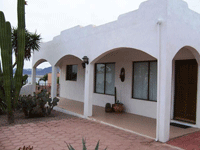

Estate & Inheritance Taxes
We mention estate taxes only because they can be a significant issue in the U.S. (at least for now). The fact is that Mexico does not have either an estate tax or an inheritance tax. You should be aware, however, that when you receive property from an inheritance or bequest, most people will want to register the property in question in their name. Property thus received is not exempt from regular registration and closing costs.
Gift Taxes
There is a tax on certain gifts in Mexico involving real estate, which is payable by the recipient of the donor's generosity. There is an important exemption however. Gifts between spouses and direct family members are not taxable. Therefore, you could gift a home to your daughter, and she would not need to pay taxes on the gift in Mexico.

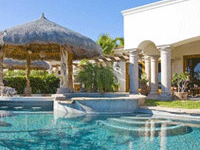
Acquisition Taxes & Registration Fees
When acquiring property, by purchase, gift, inheritance, or otherwise, there are several taxes and fees that you should be aware of. Principal among these is the acquisition tax, which runs about 2% of the property value. Other fees include: certificate of non-encumbrance, notario fees and other attorney fees and appraisal fees.
The parties to the real estate transaction usually negotiate who will pay the fees for the certificate on non-encumbrance and the appraisal. Notario fees are generally split equally between the parties. The acquiring party pays for the acquisition tax and the seller bears the burden of the capital gains taxes.
Capital Gains Taxes
When property changes hands and capital gains taxes are due, the notario withholds a certain percentage of the gains according to a formula, on behalf of the seller. The seller pays the remaining portion of the capital gains when he or she files their annual tax return in Mexico.
How capital gains are calculated on the sale of property in Mexico involves a lengthy calculation that I will spare you. I would like to mention, however, a couple of factors that go into the calculation as examples of just how different the calculation is compared to how capital gains are calculated in the U.S. First, the cost basis of the property in Mexico is adjusted for inflation. Let us assume that you bought a condo two years ago at $100,000 and then sold it at the end of the second year. Inflation during that period was 15% and 10% respectively. The price of the home would be adjusted to $115,000 the first year and then $126,500 for the second year.8 A second difference of note is that the price used to figure out the sale of the property is not necessarily what the property was sold for, as in the U.S. In Mexico many people use the appraised value or the municipal assessed value as the sales price, even though the property may have been sold for a different amount. Obviously, you may want to use the lower figure. Make sure you check with your notario before you do, however. In any case, the net result is that in Mexico the seller will pay substantially less capital gains on real estate transactions.
Finally, there is an exemption on capital gains if the property that is being sold has been used as a principal residence. In order to take advantage of the exemption, you or a direct family member (mother, son, spouse, etc.) must have lived in the home for at least two years prior to the sale. There is no ceiling on the amount of gains that can be excluded.
As always, please consult with a qualified tax consultant. A good notario is indispensable and a real estate professional may be of help as well.

Investing to Sell your House

What are the best things to do when renovating a home to sell in order to maximize the return on the effort and money invested in renovations with the best sale price?
Some of the best investments are the simplest and overall the least expensive to do. First is to clean and remove all clutter from a home. Cleanliness of a home is paramount. Think of the objections a potential buyer would have if there were pet smells, dirty bathrooms, stained carpets and grime around a cooking area. The buyer is looking at the house as a place to live and, if they feel it is dirty, they will feel uncomfortable and even unsafe. It would feel like moving into a cheap hotel used before by thousands of strangers.
Removing clutter includes excess furniture, too many pictures on the wall, too many plants, and other forms of "stuff" that has accumulated in the house. Clutter makes the home feel that it has less space and can even restrict the flow of traffic in the home.
Investments in these two ideas can provide over a 900% return on the money invested.
Paint is a common renovation project and — especially — the interior painting can have a big impact on the buyer. In general, painting will help with the sense of cleanliness of the home and also reduce the impression that the home needs maintenance. Choose warm and neutral colors that can be appealing to the majority of the buyers rather than choosing decorator colors that may be objectionable to some buyers. Investment on interior painting can provide up to a 150% return on what is invested.
Another simple concept is keeping the house light and bright. Clean skylights. Open curtains to expose clean windows. Replace burned out bulbs (or existing bulbs) with higher wattage bulbs that provide more light — this will create a warmer feeling in the house. In my opinion, incandescent bulbs provide warmer light (color). However, there are compact fluorescent bulbs that have warm light as well. Dark spaces within a home make it feel less welcoming and not as cheerful. These minor investments can have over an 800% return.
Landscaping is often overlooked but is an item that helps with the buyer's first impression. Everything needs to be green and, hopefully, with some color from flowers. Dead or overgrown plants, uncut lawns and brown patches on the lawn as a buyer walks up to the house, would cause them to feel the house is neglected. But a garden or lawn that is green and healthy provides a feeling of peace and relaxation. These can be accomplished as simply as regular watering and adding fertilizer. Investment on gardening can provide up to a 400% return on what is invested.
Bathrooms and kitchens are key spaces within the home and their cleanliness and appearance are very important for the sale of a home. Remove the clutter and have open spaces in the bathroom and kitchen countertops. Consider replacing the toilet seat or very old and dated fixtures. Replace loose or leaking faucet fixtures and make sure the toilet flushes without difficulty. Clean or redo the grout lines, install new caulk around countertops, sinks, tubs and showers. These jobs are generally low-cost and can have up to a 250% return on what is invested.
And finally, the concept of staging should also be considered. Fresh flowers, home baking aromas and soft instrumental music or nature sounds can provide an ambience that will help provide the hospitable feeling is needed to attract the right buyer. These small investments can provide up to a 250% return on investment.
With these rates of return on investment, it would be illogical to keep your money in the bank while waiting to sell your home.